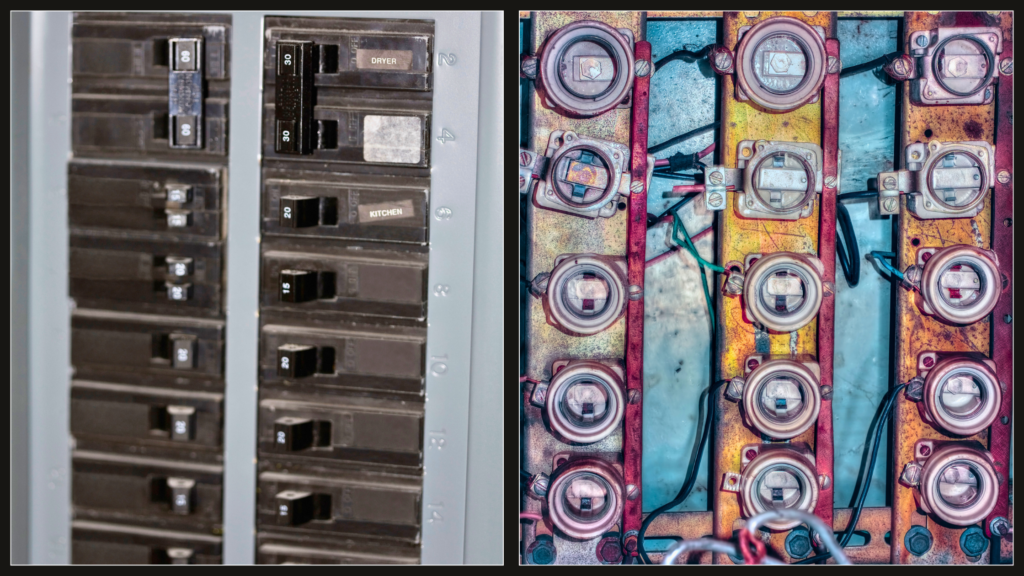When it comes to protecting your home’s electrical system, you’ve likely heard about both circuit breakers and fuses. While they serve the same purpose — preventing electrical overloads and potential fires — their design and functionality differ significantly. For homeowners, understanding the difference between circuit breakers and fuses can help you make informed decisions about maintaining or upgrading your electrical system. In this guide, we’ll break down how they work, their advantages and disadvantages, and how to decide when it might be time to upgrade.
What Are Circuit Breakers and Fuses?
Both circuit breakers and fuses are protective devices designed to stop the flow of electricity when a fault, such as an overload or short circuit, occurs. They act as safeguards for your home, preventing excessive current from damaging your electrical system or causing fires.
Circuit Breakers: These are automatic electrical switches that interrupt power when a fault is detected. They’re commonly found in modern electrical panels and can be reset after tripping.
Fuses: Fuses are devices containing a thin wire or filament that melts when exposed to excessive current. Unlike circuit breakers, fuses must be replaced once they’ve blown.
How They Work: The Key Differences
Circuit Breakers:
Automatic Resetting: When a circuit breaker trips due to an overload, you can simply reset it by flipping the switch back on.
Reusable: Circuit breakers are designed to be used repeatedly, making them cost-effective over time.
Modern Technology: Many circuit breakers include advanced features, such as the ability to detect ground faults or arc faults.
Fuses:
Single Use: Fuses work by allowing a filament to melt when the electrical current exceeds safe levels. Once it melts, the fuse blows and must be replaced.
Simple Design: Fuses are straightforward devices that don’t require resetting mechanisms.
Reliable Performance: Fuses act quickly and precisely, making them very effective in preventing electrical damage.
While both devices accomplish the same task, their operational differences influence how they’re used in homes today.
Advantages of Circuit Breakers:
Convenience: The ability to reset a circuit breaker makes it a convenient option for homeowners. There’s no need to stock replacements or deal with frequent replacements after a fault.
Advanced Features: Modern circuit breakers often come with added safety functions, such as detecting arc faults (sparks caused by damaged wiring) and ground faults (electricity flowing where it shouldn’t).
Longevity: Circuit breakers are durable and can last for years with proper maintenance, making them a long-term investment.
Compatibility with Modern Systems: Today’s electrical systems are designed with circuit breakers in mind, making them more compatible with advanced home technologies.
Advantages of Fuses:
Precision: Fuses respond quickly and accurately to overcurrent situations, ensuring effective protection for your electrical system.
Cost-Effectiveness: While fuses need replacing after every fault, they are typically inexpensive, making them a budget-friendly option in the short term.
Simplicity: Their straightforward design makes fuses easy to understand and install, even for older systems.

Why Most Homes Use Circuit Breakers Today
While fuses are still found in older homes, most modern properties use circuit breakers. This is largely due to their convenience, reusability, and ability to handle today’s electrical demands. Circuit breakers are better suited for homes with modern appliances and smart systems, which require consistent and reliable power.
Upgrading Your System:
If your home still uses a fuse box, upgrading to a circuit breaker panel may be worth considering. Circuit breakers not only offer enhanced safety but also increase the electrical capacity of your home, allowing you to add more outlets, appliances, or even smart home devices without risking overloads.
Are There Risks of Using Fuses?
While fuses are effective, they come with limitations that may not align with modern electrical needs. Here are some potential risks:
Overloading: Fuses in older systems are often paired with wiring that wasn’t designed to handle today’s electrical demands. This can lead to frequent blowouts and, in severe cases, overheating.
Limited Safety Features: Unlike circuit breakers, fuses don’t have advanced fault detection capabilities, such as identifying arc faults or ground faults.
Inconvenience: If a fuse blows during a power surge or fault, you’ll need to replace it manually, which can be time-consuming and inconvenient.
For these reasons, many homeowners choose to transition from fuse boxes to circuit breaker panels.
Signs It’s Time To Upgrade To Circuit Breakers
If your home still relies on a fuse box, it might be time to consider an upgrade. Look for the following signs:
Frequent Fuse Blowouts: If you’re constantly replacing fuses, your system may not be able to handle the electrical load of your home.
Appliance or Device Limitations: Older systems with fuses often struggle to power modern appliances and electronics.
Insurance Requirements: Some insurance companies may require homes to upgrade to circuit breakers to maintain coverage.
Renovation or Expansion Plans: Adding new appliances, outlets, or rooms may require more electrical capacity than a fuse box can provide.
Upgrading to a circuit breaker panel not only improves safety but also ensures your home can handle today’s energy needs.
Choose The Right Option For Your Home
Understanding the differences between circuit breakers and fuses is key to maintaining a safe and functional electrical system in your home. While both devices are effective in preventing electrical overloads, circuit breakers offer the convenience, safety features, and compatibility needed for modern living.
If you’re considering an upgrade or need help diagnosing electrical issues, Beattie Dukelow Electrical Inc. is here to help. Serving Prescott, Ontario, and the surrounding areas, our team can inspect your system, recommend the best solutions, and ensure your home meets today’s electrical standards. Contact us today to get started.

